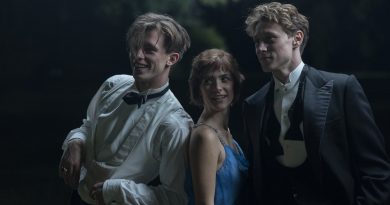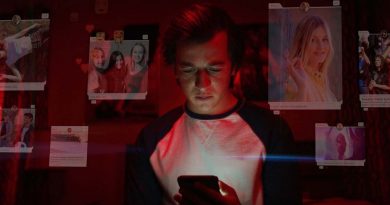Close-Up with… Eric Bana, on Special Correspondents

Laid back (quite literally on a comfy looking sofa) and relaxed, Eric Bana in real life is as far from his new onscreen persona of Frank Bonneville than you could imagine.
However, Eric and Frank do share a temper that makes people laugh at them rather than take them more seriously we learn….
With this project, Eric was working with a comedy idol for him in Ricky Gervais. We talk about their relationship on and off screen, the sensationalist fame culture the film mocks and the biggest challenge being trying not to laugh.
Special Correspondents, a new original feature film for Netflix written, directed and co-starring Ricky Gervais and Eric Bana is about an arrogant New York-based radio journalist Frank Bonneville (Bana) who takes floundering British sound engineer Ian Finch (Gervais) under his wing when they are sent out on assignment together. But events quickly unravel in this farcical buddy movie.
What first attracted you to the project? Was it the media ethics and the comment on integrity?
Oh yes! No, actually it was getting the chance to go back to Toronto again. No, it was Ricky. I got a call saying that Ricky was working on this particular project, and I was like, wow great I’m a huge fan – I’ll watch it. Then, ‘I’ll send you the script’. I said ‘what for?’. ‘Well, Ricky wants you to play the character of Frank Bonneville’, and I was like ‘does Ricky actually know who I am?’. At first when it’s someone you’re really a fan of you just can’t believe they know you exist, so stating the obvious, that was the reason and I read it and thought it was a great premise. I saw the French version of the film and I was pretty certain that Ricky could do a funnier version of that because I thought the premise had more comedy opportunity in it and yeah, just sort of jumped.
What in particular about Ricky are you a fan of?
A fan of everything. I don’t know how to explain… it’s probably because (of my background) I identify [with him, in that] if the characters are good, you get away with a lot more, as character is king in comedy, more so than an idea. So in the same way that my other favourites like Christopher Guest and Michael McKeane and that world, it’s always the characters that you sit through. The character is almost above the material, but with Ricky he quite often executes at both levels. The characters are completely watchable no matter what they are doing, and the writing is really funny as well so you sort of get the best of both.
Ricky is the writer/director and your co-star. What was it like to work with him in all these different roles?
I wasn’t envious of him at all in terms of the pressure, but he handled it really well. There’s plenty of times when you’re just having so much fun and he’s pissing himself laughing, and you’re laughing and you’re thinking [Eric puts his head in his hands] he must get frustrated with us at some point that we’re not getting this scene because he’s the director as well and he’s going to have to go away and edit it. So it swings between having a lot of fun and going ‘Ricky, seriously, seriously, we’ve got to get this, you’re going to really need this shot in the edit, let’s just not break for lunch quite yet, just please’ and he goes [cue impression] ‘no, we’re never going to get it, let’s just go for lunch’. It was kind of weird, I’d go from being the one laughing to giving him a slap saying ‘come on! We’ve got to get it together which just seemed kind of bizarre.’
You started out in comedy, but your films are often serious, [Eric puts in “all my movies have been comedies; broad, broad comedies”] is comedy something you want to get back to, what caused the shift?
Well no real shift, my brain still works [the same way] as my background [taught me]. I started out in stand-up and then went into sketch and that’s all I did for ten years before I started doing drama. And to this day all through my career, on-set my brain still functions like a sketch comedy writer. So one of the reasons I’ve never written a narrative feature is that’s not how my brain thinks, so my brain still makes observations and breaks them down into three minute ideas. So in this case, I thought this is a good way to get ‘back in’ (which isn’t really the right term) – to go and do something that’s going to be fun, working with one of my idols and I felt very safe. If it was someone that I didn’t know and they had no comedy background and they came to me with this project – I wouldn’t do it. So it was a combination of Ricky being in charge and feeling very confident that we could also come up with something extra that wasn’t on the page through us working well together. Ricky actually didn’t know about my comedy background so a lot of the stuff that we got in the film just came about through us having fun just during the shoot and us seeing more potential for more laughs in different places.
Talking of having a lot of fun when shooting… was there anything cut that we didn’t see or any off-screen capers?
Yeah, I know that his initial cut was pretty long. There were a few bits where we really went for it in some scenes, then they became really long then there would be a separate bit that would occur and you’d go off on a tangent and have this whole conversation about something that would have nothing to do with the plot. Obviously, some of those got cut but some of them are still in the film I think… most of them. I guess that’s the spirit of ad-libbing; you know there’s a very good chance that it won’t actually be seen, but you still do it anyway.
Did you draw for any real-life sources for your character?
Sub-consciously I think for sure, Australia has a big radio culture, like here. So to this day I still listen to a lot of talk radio so I’m sure I was influenced by certain people, radio people and television people. You can always sniff a Frank Bonneville, you can always tell when you’re watching someone who thinks they should be moving on and doing something bigger than what they are. So no one specific but definitely the by-product of people I’ve seen and heard over the years.
I didn’t do an internship or anything in preparation for my role, I can’t give you a juicy name.
Frank’s character can be quite mean and abrasive, especially to Ian, how do you balance that with not alienating the audience? Can you still make him likeable in some way?
Unfortunately, I identified that, much like with myself, the angrier Frank gets [cue Hulk reference we failed to make] the funnier the dynamic. I experience that in my own life where if I’m really pissed off about stuff and I’m going on a rant at home, everyone’s pissing themselves laughing and I’m going ‘no, this is not meant… no this is not funny!’ so Ricky find it hilarious when Frank would really… like the more abusive I would be, the worse I would treat him, the funnier for him it got. So we kept that angle going.
The only thing I was conscious or concerned about was when Frank [spoiler spoiler spoiler] – we can’t muck around with that moment, we have to see that Frank is really floored by that and that he’s kind of devastated. It can’t just be [Eric snaps his fingers] ‘hey, whatev, moving on..’, I knew that was one that we couldn’t get away with being an absolute dick about. But otherwise I think we just believe that he’s got a huge ego and that he’s dismissive of Finch but that he really warms to him during the course of the story but I also think it wouldn’t be the end of the world if people thought Frank was a dick. I wasn’t worried about the ‘cinema score’ in terms of ‘Is Frank a dick or not?’.
Did you face any challenges?
Um, not really, no! Just trying not to laugh and trying to get the day done. It’s actually quite a lot of dialogue though and Ricky would quite often – I think it’s a by-product of being a director – he’d give me lines (sometimes his lines) and it would make no sense if I say it, look at this, this is your character saying ‘Frank, we need to…’ – I actually can’t say that. So my dialogue got bigger and bigger as time went on. Ricky was always a fan of palming off bit of explanation or dialogue to me. That was my biggest challenge, if you want to call it that.
What is your biggest Frank-sized blag?
I think my career… I can’t think of one from my personal life from off the top of my head.
The film touches on the media’s obsession with celebrity culture. Is that something which frustrates you?
I loved the whole [idea of] Vera’s character and the way she somehow makes all of this about her. The point where she’s on The Tonight Show with Kelly’s character… oh my god it’s so, so funny. It definitely echoes the sorts of things that occur now. It’s a great character and I don’t know if anyone other than Vera could have pulled it off because she’s so mean and she’s so self-centred but she’s still funny. It’s one of the trickiest characters to pull off and I think she does it with such conviction.
It’s just a reality. Actually, celebrity culture’s not the term because it’s more like fame culture. It’s more like narcissism culture. [The public] aren’t actually interested in celebrities, they are interested in people who are determined to be celebrities. I don’t know if that’s because we’re all a bit cruel and deep-down we all know it ends in a crash and that’s why we’re so obsessed with watching it. I feel a bit uneasy about it sometimes and think ‘oh, can we just let that person go… let them have a crash in privacy’.
Our review to follow shortly…
Special Correspondents will launch exclusively on Netflix on April 29th.


